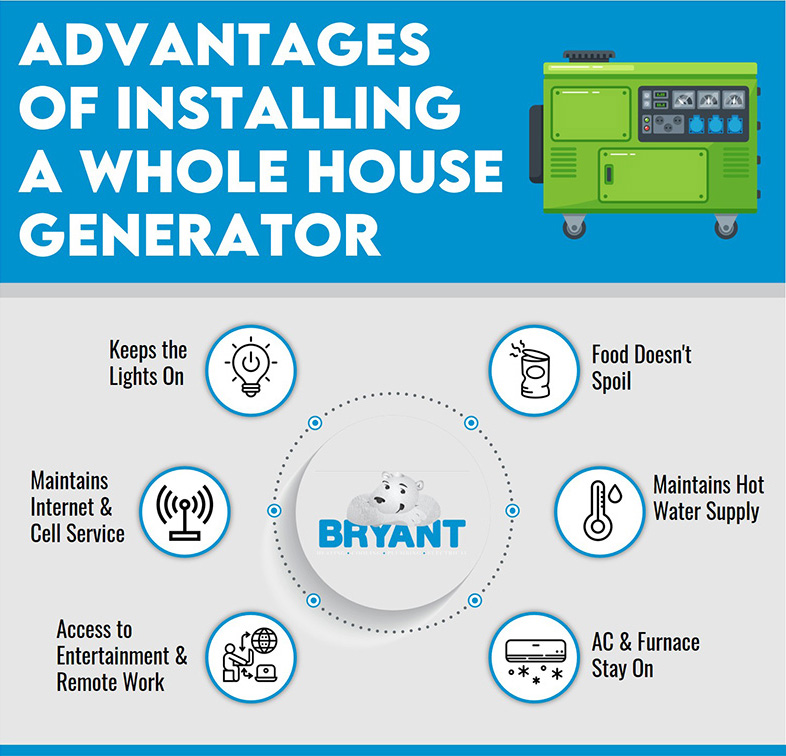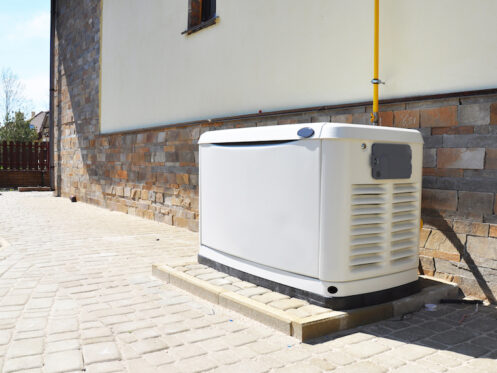A home backup generator is a fantastic investment, providing many benefits during a power outage or blackout. The U.S. Environmental Protection Agency (EPA) suggests that extreme weather events like heat waves and large storms will likely become more frequent due to global warming. This change in weather patterns, combined with an aging power grid, means there is an increasing risk that you could suddenly be without power for hours or even days. Unlike portable generators that can only power a few things, a whole-home generator is directly wired into your electrical system and can provide power to everything in your home. You also won’t have to worry about refueling the generator since it will be connected to your natural gas supply, propane tank, or diesel tank.
Keep the Lights On
Having to use candles and flashlights to see in the dark when your power is out is always a major hassle. With a backup generator, this isn’t something you’ll ever need to worry about since all of your lights will come back on almost immediately. A backup generator works by connecting to your house’s main electrical panel via a device known as an automated transfer switch (ATS). The ATS monitors the power coming into your home from the local electrical grid. This allows it to immediately detect when the power goes out and then send a signal to the generator to start running. The generator sends power to the home almost immediately, which means your power will usually be restored within 30 seconds.
At the same time as the generator starts, the ATS also temporarily disconnects the home’s electrical system from the grid. This protocol ensures that all the electricity the generator produces flows into the house and can’t leak into the grid. One reason disconnecting the home matters is that you can make full use of the power coming from the generator to ensure that all of your electricity needs are met. However, the main reason is to prevent safety issues. If any electricity were to flow into the grid, it could create a significant safety hazard for the utility workers trying to restore the power. The Occupational Safety and Health Administration (OSHA) and the Electrical Safety Foundation International (ESFI) both warn about the dangers of back-feeding and emphasize the importance of proper generator use, including the use of an ATS to prevent such risks.
Maintain Connectivity During Power Outages
Nowadays, cell phones are a lifeline, and you may have joined the 65% of American households that have transitioned away from having landlines in their homes. If the power in your area is out for a prolonged period, the battery in your phone will eventually run out of power. That means you’ll have no way to contact and check up on loved ones, check the news, or even contact emergency services.
A generator is indispensable during a prolonged power outage for powering devices you use to communicate with others. An alternative power supply is also necessary to operate critical systems such as sump pumps and medical equipment during outages.
Access to Entertainment and Work

A short power outage can allow your family to bond by playing board games by candlelight and hanging out together. However, during a prolonged outage, family members may get restless without their usual entertainment options. Additionally, homeowners who work from home full-time or part-time will find it impossible to stay productive without electricity. A generator keeps your family entertained by powering your Wi-Fi network, TVs, and devices and ensures that remote work can continue uninterrupted, maintaining both comfort and productivity.
Ensure Your Food Stays Cold
One of the biggest issues during a prolonged power outage is the risk of food spoilage in your refrigerator and freezer. If your freezer is mostly full, the food will typically stay frozen for about 48 hours if you keep the door closed. If it’s only half full, the food can become unsafe to eat in as little as 24 hours. Perishable items in your refrigerator, like meat and dairy products, will spoil within a much shorter timeframe. Considering the high cost of groceries, having to throw out and replace all of your food could be a major yet unavoidable expense. This is another area where a backup generator is extremely useful since it will allow you to keep your food cold. It will also allow you to prepare meals if you have an electric stove or use your microwave.
Maintain Your Hot Water Supply
If the power is off, you may also run out of hot water quickly because every type of water heater requires electricity to continue working. This is true even if you have an older model with a pilot light. The reason is that the thermocouple that detects if the pilot light is lit uses a small amount of electricity. If the power is off, the thermocouple won’t work, and the hot water heater will not run. With a backup generator, no matter what kind of water heater you have, you will have enough hot water to shower, wash dishes, and do laundry.
Homes connected to a municipal water supply will continue to have water because utility companies usually have backup generators. However, if you have a well, you will be left without water during the outage without an alternative power supply.
Continue Running Your AC System
The unit must be sufficiently robust when choosing which backup generator to install for your home. The main thing electricians focus on when determining what size of generator any home needs is the size of the central AC unit or heat pump. That’s because these units typically have the highest power needs out of everything in a home.
As long as you choose the right size generator, you can still keep your air conditioning running. That way, you can ensure everyone remains comfortable and prevent your home from becoming unbearably hot and humid. If you lose power during a heat wave, a generator can also be essential to keep your home cool and prevent heat-related health issues such as heat stroke.
Avoid Frozen Pipes and a Dangerously Cold Home
Having no power in the winter can be especially serious since you’ll have no way to heat your home unless you have a wood fireplace. That means your home will quickly become too cold, and you may have to rent a hotel room or stay with friends or family. Another issue is that if the temperature outside is below freezing, your house will eventually get cold enough that your pipes may freeze and burst. Leaving a trickle of water running in your sinks and showers can help prevent this, but then there’s also a risk that the drain pipes could freeze up. A backup generator will ensure that your heating still runs so that you stay warm and comfortable and won’t need to worry about major plumbing issues occurring.
If you’re considering a backup generator for your home in Indiana, Kentucky, or Ohio, you can turn to Bryant Heating, Cooling, Plumbing & Electric for expert advice and assistance. We offer a range of top-quality backup generators, and our team of electricians will ensure that you get the size you need for your home. We have over 80 years of experience and serve customers throughout the Bowling Green, Louisville, Lexington, Cincinnati, and Evansville areas. For more information on the backup generators we offer or to schedule any electrical, heating, air conditioning, or plumbing service, contact us today.



